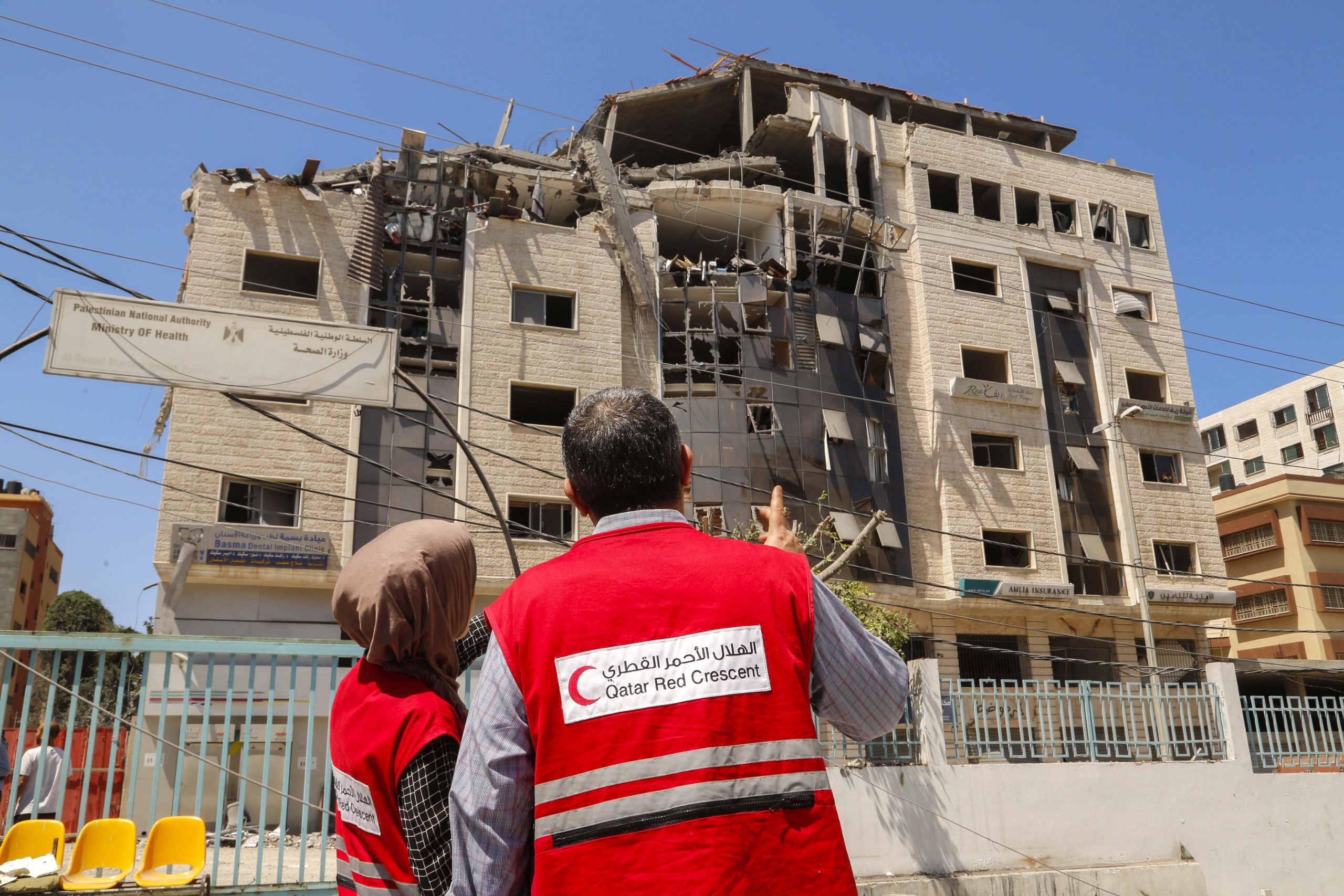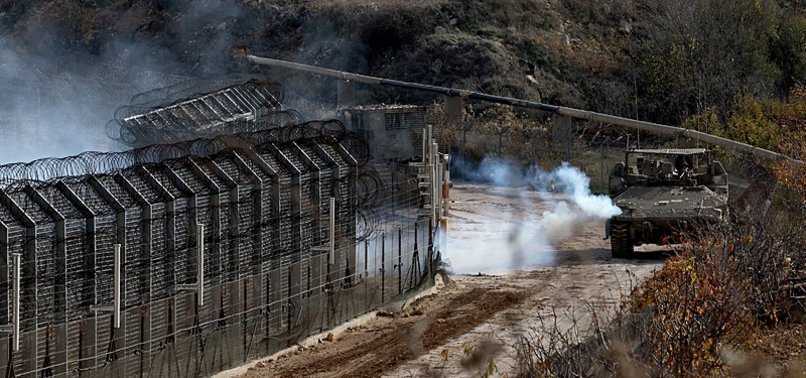The organisation’s building in Gaza was bombed during an 11-day Israeli offensive in which at least 250 Palestinians were killed.
June 23rd marks the UN Public Service day, which aims to acknowledge and celebrate the value of public service around the world. To mark the day we focus on Doha’s first ever charitable organisation – Qatar Red Crescent Society [QRCS].
Doha News spoke to Faisal Mohammed Al-Emadi, the executive director of QRCS’ International Relief & Development Sector to learn more about the organisation’s ability to carry out its work despite the restrictions it faces in crises-stricken countries as well as the coronavirus pandemic.
QRCS has 12 missions around the world where volunteers work to provide adequate services to those in need, from Afghanistan, Iraq, to Ethiopia.
Recently, its headquarters in Gaza was destroyed during an 11-day Israeli offensive on the besieged city, in which over 250 Palestinians were killed, including dozens of children.
Despite this, the charity powered through to offer Palestinians its services.
“Work continued as normal and a day after the attack we distributed up to 600 food parcels that helped 3,600 families or individuals, and our projects are still ongoing. We also injected $1 million from our headquarters in aid,” said Al-Emadi.
The QRCS official said challenges that emerged amid the ongoing coronavirus pandemic were tackled using technology, enabling the charity to carry out its operations from a distance.

“It’s important that people know that we didn’t stop our operations in Gaza, before, during and after the airstrikes. This was one of the benefits of technology…I think the period during the [outbreak] of the coronavirus virus, when we all stayed at home and worked remotely, and the infrastructure of the building helped…you don’t need to be physically present,” he added.
The headquarters in Gaza was bombed without warning and fortunately, no casualties were reported as no one was on site. Its aid storage was not affected as it was placed in a different area along with that belonging to the Palestinian Red Crescent.
“It’s a situation where ‘if I went to work my name would end up on the list of deaths’,” Subhi Ejjeh, head of relief and disaster management at QRCS also told Doha News.
Al-Emadi also said that the team was able to immediately head back to the site and assess the damage it sustained to later purchase the required material from local stores.
As it stands, the office is almost ready to open again.
QRCS has operated in Gaza and the West Bank since 2005 and currently has 16 staff members scattered in both areas.
“Gaza is always subject to crises and wars so during our time there we gained experience on crisis management. We [QRCS] were there at the beginning of the offensive and first to deliver aid,” said Aiham Al Sukhni, head of planning and studies at QRCS.
Among its many programmes in Palestinian territories is the Emiri Medical Scholarship Program, a cooperation between QRCS and Hamad Medical Corporation [HMC] that was launched in 2003 with the aim to train 10 Palestinian physicians in Qatar.
Selected candidates from Gaza and the West Bank study a wide range of postgraduate medical specialisations for four-to-five years to qualify for certification by the Arab Board of Health Specialisations [ABHS]. The programme will dispatch its ninth batch this year.

The initiative has helped provide medics on the ground in Gaza to treat patients throughout the latest Israeli offensive to make up for a shortage in staff.
In total, it benefitted 71 physicians, of which 36 were from Gaza and 35 from the West Bank.
Global health challenge
The pandemic has exacerbated circumstances for disadvantaged families across the world, creating an essential need for a different type of aid to tackle the disease.
Most recently, QRCS took its aid services to a different level by partnering with the World Health Organszation to launch its “I Am Vaccinated, I Donated” initiative, a project to raise money to help vaccinate more than three million refugees and displaced people in 20 countries around the world.
“The idea came after analysing the world’s current issues. We saw that this is a major crisis and countries are fighting to obtain doses of the coronavirus vaccine to vaccinate their own citizens. But what about the refugees in need?” said Al-Emadi.
Read also: Qatar launches major Covid-19 vaccination drive for refugees worldwide
Among the countries listed by QRCS to receive vaccines is Afghanistan, Bangladesh, northern Syria, occupied Palestinian territories and Yemen.
Commenting on the $100 million project’s duration, Al-Emadi said that the aid will be delivered as they receive the donations and QRCS might expand the initiative’s period depending on the needs recorded.
”Refugees are often forgotten and this is dangerous. We’re talking about 82 million refugees around the world. They are left behind during the vaccine campaign and it poses a threat on them,” said Al Sukhni.
According to him, 65% of QRCS’ projects focus on the health sector.
Crisis management training
As a partner of several humanitarian organisations, such as the United Nations Office for the Coordination of Humanitarian Affairs [OCHA], QRCS focuses on learning from other charities’ experiences to provide training.
Among its several training initiatives is the Disaster Management Camp, where volunteers from around the world come to Qatar in deserted areas that are fully equipped for trainees to experience real life situations.
The instructors bring in helicopters, place trainees in tents, hire actors and even conduct fake kidnapping scenarios without the knowledge of the volunteers.
The programme, which will complete its ninth edition, is the first to be offered in Arabic and aims to send up to 100 trainees back to their countries to benefit their own communities.
“If you look at the Palestinian Red Crescent, you will find that all their staff are Palestinians,” said Al Sukhni.
At the end of the camp, experts conduct a psychological analysis to determine whether the trainees are ready to be dispatched abroad.
QRCS staff, including Ejjeh, attended one of the camps which prepared him to provide humanitarian assistance in Nepal during the 2015 earthquake.
“Our experience was difficult. The earthquake’s magnitude was 8 on the Richter scale and 8,000 people died. The infrastructure was destroyed,” said Ejjeh.

Up to 30 people, a field hospital and medics were deployed to provide assistance in what was QRCS’ biggest relief operation.
“Imagine sleeping in a small tent for a month, you wake up to provide assistance and try your best to prepare aid kits. Throughout the month, we witnessed at least four aftershocks, we were always at risk,” he said, adding that he had to reconnect families following the earthquake.
However, “what alleviated the work pressure was hearing people’s response and seeing their smiles,” added Ejjeh.
Here in Qatar, the organisation conducted psychological support sessions to those infected with the coronavirus in Mekaines quarantine facility.
Recounting their experience, the QRCS staff expressed the difficulty of the situation as they were at a high risk of being infected and had to provide assistance from a physical distance to patients in the same room.
“At the end, we have to keep going, this is the nature of our work. We work in all conditions, whether they are peaceful or not.”
Follow Doha News on Twitter, Instagram, Facebook and Youtube







